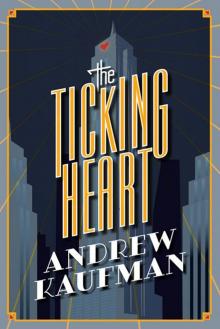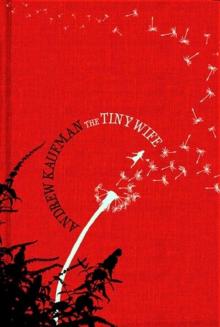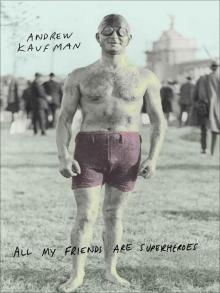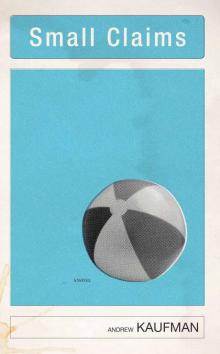- Home
- Andrew Kaufman
The Ticking Heart Page 2
The Ticking Heart Read online
Page 2
‘My husband has lost his heart. I need you to find it. I know you’re dying to make a smart-ass comment. You want to ask me if I’ve checked his other pants. The glovebox? Next you’ll want to suggest that maybe it’s not lost – maybe someone stole it. Finally, a smug masculine superiority will beam out of you as you give me a look that implies you’ve thought of something I haven’t. You’ll pause dramatically before asking, “Isn’t it possible that he simply gave it away to someone else?”’
This was true. Charlie wanted to do and say all of these things.
‘So let’s just forgo all of that. I’m his wife, Charlie. I feel its absence. I need it back. He can’t love me without it. You can have your heart back when you bring me his. You have twenty-four hours.’
‘And then?’
‘Charlie goes boom.’ She paused. ‘My husband works in the Tachycardia Tower. He’ll be easy to spot. His friends call him Twiggy.’
‘That’s all you’re going to give me? A nickname and address?’
‘And twenty-four hours. Don’t forget that, Charlie. That’s very important.’
‘That isn’t enough!’
‘This is Metaphoria, Charlie. If that isn’t more than ample, there’s no hope for any of us.’
3
THE TWO CHANNELS
As Shirley closed the door to the Epiphany Detective Agency behind her, the office became quiet. Charlie could hear nothing but the ticking of the bomb in his chest. The sound was disconcerting because it hit his eardrums from inside. This was something Charlie had never experienced before. He did not like it. Feeling overwhelmed, he lifted his feet, put his hand on the corner of the desk, and pushed, which caused his chair to spin, something he hadn’t done since he was a child.
Charlie watched the room revolve. The furniture included the desk he sat behind, two chairs in front of it, a bookshelf, and nothing else. The wall behind the desk had one small window. The wall across from the desk was covered with framed headshots of, Charlie assumed, all the other people who had worked as a detective in this office before him. The chair stopped spinning, allowing Charlie to see that the last picture in the bottom row was his.
He looked at his watch. The face no longer showed the time. It was now a digital countdown of how many seconds, minutes, and hours Charlie had before the bomb in his chest exploded.
His watch said:
23 HR 58 MIN 11 SEC
Charlie realized he had a literal expiry date. He looked away from the watch. He noticed a walkie-talkie, which was black, rectangular, and, because of its positon in the precise centre of the desk, impossible to ignore. It appeared to be an exact replica of the one he’d had when he was eleven. Charlie briefly wondered if it was the very same one, until he saw the modification. Where the walkie-talkie Charlie had when he was eleven featured a dial that let him choose from seven channels, this one had a switch, offering only two channels.
One was marked
LINDA (EX-WIFE)
The other read
WANDA (UNCOMMITTED LOVER)
Charlie resented both the ‘ex’ before ‘wife,’ and the ‘uncommitted’ before ‘lover.’ He wondered if either Linda or Wanda would have felt the same way. It did not take him long to decide they wouldn’t. Charlie turned the walkie-talkie on. A green light in the upper right-hand corner shone, revealing that the device was fully charged. The switch that selected the channel sat in between the two options. Charlie had a decision to make. Quickly, he selected ‘Linda.’
‘Linda?’
‘Charlie? Hello? Charlie?’
Her voice sounded like home. Not just any home, but the home Charlie longed to return to. A home where the divorce never happened, where the daily course of ordinary events, the raising of children, various professional promotions and setbacks, twenty years of pettiness and empathy fatigue hadn’t caused them to inch farther apart, until reunification became an impossibility. Here in Metaphoria, it was clear to Charlie that this home was not a location, or even a belief, but a delusion, a vision manifested by wishful thinking and unrealistic hope. Charlie knew this to be true. That did not make him want to go there any less.
‘Yes, I’m here. I’m here. How are you?’
‘Don’t forget that Friday’s a P.A. day.’ Charlie could hear his kids arguing in the background, the scrape of the chairs across the floor. This is how Charlie knew that while he was using a walkie-talkie, Linda believed she was simply on the phone. But much more revealing was how the ambient sound of a wooden chair sliding across linoleum floor made Charlie’s heart ache. The fact that he was with his kids only half the time hadn’t provoked him to make every second significant, which is what he’d thought would happen, but instead caused him to honour the moments that were unremarkable. Because these everyday moments now happened only half as often, Charlie had begun to find them twice as significant. Which is why the sound of the chair scraping across the kitchen floor almost reduced him to tears.
‘I don’t know what you want to do with the kids.’ Linda didn’t notice that Charlie was near tears. Or she was good enough not to mention it if she had. ‘They can go over to your place early, or they can stay here. It doesn’t matter to me. Why don’t you text them and tell them what you want to do? But don’t forget Mark has karate at seven. His uniform is in the yellow bag.’
‘It’s at eight. They moved the time.’
‘I’ve got a work call coming in. Gotta go.’
‘Can I just ask you one thing?’
‘Quickly.’
‘Do you still love me?’ Charlie, still slightly burst open by the sound of the wooden chair on the floor, had been unable to stop himself from asking this. He listened to a silence that was interrupted only by the ticking.
‘Listen, Charlie. I think a lot of this is about you feeling guilty. I’m your ex-wife, and I’m telling you straight out: you didn’t do anything wrong. Neither of us did. We’re both better people now and, more importantly, better parents. You and I lasted as long as we did. And it was great while it was great, but it ended. It’s over. I have accepted that. I’ve healed. You gotta start asking yourself why you haven’t. I really do have to get this call. Don’t forget about karate.’
Static came out of the walkie-talkie. Charlie hated how casually Linda talked to him. It was a recent development. She used to be angry, and then she was perpetually disappointed, treating him as she would a younger sibling. Realizing that she no longer treated him either of these ways made Charlie feel anxious. His anxiety grew. It was a deep, thick anxiety, unlike anything he had ever felt before. It spread quickly. It coated all of his thoughts. The list of contributing factors grew: having to find Twiggy’s heart in twenty-four hours, having to have the right kind of epiphany, needing to get out of Metaphoria in time to get the kids to karate. All of these things increased Charlie’s anxiety. His breathing became rapid and shallow. He began sweating. A slight tremble came into his hands. Feeling dizzy, Charlie looked down at the floor and noticed that it was getting closer. He looked up and saw that the ceiling was moving farther away. It took him several moments before he realized that he had begun to shrink.
4
THE CONSEQUENCES OF DOUBT
The cuffs of Charlie Waterfield’s shirt slid over his hands. His watch slid off his wrist. His pants bunched up around his ankles. Charlie tried not to panic. He failed. His panic increased how quickly he shrank. The black-and-white floor tiles rushed toward him. His jacket and then his dress shirt slipped from his rapidly diminishing shoulders. At his present rate of shrinking, Charlie would disappear in less than a minute. It was at this moment that he saw his reflection in the blade of the knife Shirley Miller had dropped on the floor.
The blade of the knife rested against the leg of the desk, so that as Charlie looked down, his reflection looked directly at him. As Charlie continued shrinking, his reflection grew larger and larger. It was impossible to determine whether this was a trick of light and reflective surfaces or whether it was actually happeni
ng. When he realized that the dried blood along the edge of the knife was his, Charlie looked away. He continued shrinking. It was desperation that compelled Charlie to look back at the knife, and when he did, his reflection began acting independently.
‘Hope is a weapon, most often used against oneself,’ Charlie’s reflection said.
‘What the hell does that mean?’
‘You’ll get it.’
‘That is not helping.’
‘Yes it is. Breathe. Just breathe. Breathe in, hold it, let it tumble out of your lungs like water in a stream.’
‘Jesus! Enough! Give me something I can use!’
‘I’m trying to!’
Charlie did not feel like he had enough time to experiment with his reflection’s suggestion. But he didn’t have any other ideas. He continued shrinking. His rate of shrinking increased even more. Becoming desperate, Charlie took a large breath. He kept it in, then he let it tumble out of his lungs like water in a stream. Doing this made him feel extremely embarrassed, but he had to admit it also made him feel better. Charlie’s rate of shrinking slowed, although it did not cease.
‘What I’m trying to suggest is that commonly held notions and conceptions of hope, ones you obviously entirely agree with, could very well be flawed. Are you open to that idea?’
‘You’re saying that hope is a bad thing?’
‘I’m saying that hope is a many-sided thing. I’m saying that hope is a very powerful force. And like all powerful forces, it can be used for good or bad, constructively or destructively. Hope’s function changes depending on the needs of the person holding on to it.’
‘Even in Metaphoria?’
‘Even more so.’
‘You’re telling me to give up hope?’
‘I’m telling you to question your intent. I’m asking you to think about how you’re using hope. I’m suggesting – and sorry, you’ll have to forgive me but there is no other way to say this – that you need to becoming motivated not so much by hope, but by following your heart.’
‘Easier said than done.’
‘Yes, but there is a trick to following your heart.’ ‘Care to pass it on?’ ‘You have to give up all belief that you can control where it’s heading.’
Charlie Waterfield felt this was true. As far as advice goes, it was more abstract than he’d have liked, but nonetheless the words of his reflection in the blade of the knife that had recently cut out his heart had a calming effect. Charlie closed his eyes. He took a deep breath. He couldn’t ignore the ticking, but he was able to lower his response when each tick happened. He took a second deep breath and then a third. On the fourth, the sound of the ticking in his ears became almost soothing; the metronomic pace brought order to Charlie’s speeding thoughts. His fingers got longer. His toes pushed outward. His legs increased in length.
Charlie returned to his original size. He gathered his clothes. He dressed. He sat on the chair behind the desk and tied his shoes, thinking about what his reflection had said, that he needed to rethink his ideas on hope. Charlie knew he needed to do this. He could feel it in his heart.
But exactly where his heart was, he did not know.
5
THE N.E.E.D.
The Tachycardia Tower was the tallest building in all of Metaphoria, ninety-nine storeys of steel and glass that rose upward without hesitation or compassion. The windows were always clean. The sidewalk in front of it was made of gold. The revolving door let some people in and turned others away. Occasionally people inside the building would stand at the windows and look out, their faces blank and impossible to read. The building stood at the corner of Wealth and Acquisition, the very heart of the Never-Ever-Enough District, and was considered the most prestigious address in all of Metaphoria. It attracted the city’s wealthiest, most powerful people, prosperous and well-respected citizens who had lived here for years, if not decades, and who had acquired great influence, if rather miserable lives, by never questioning their motives.
Charlie didn’t know any of that. He just didn’t like the look of the building. Typically, he appreciated this form of architecture. He loved the unembellished lines of the glass-and-steel box. But there was something about this building that just didn’t sit right with him. It wasn’t only that the building felt cold, or how it conveyed aloofness as it looked down on all the other buildings surrounding it. To Charlie, the building felt untrustworthy, a feeling he’d never had about a building before. He couldn’t specifically say why he felt the building was untrustworthy, but the sensation was so strong that Charlie wondered if someone who spent their days working in such a place could have a heart to lose.
Charlie parked in the shadow of the Tachycardia Tower. He’d been surprised that his position as the sole detective of the Epiphany Detective Agency had come with a car. Shortly after returning to his original height, Charlie had discovered a set of car keys hanging to the right of the office door. He was even more surprised to learn they unlocked the apple-red Corvette parked in front of the building. It was with a teenaged glee that Charlie started the engine and drove, guided by some kind of instinct, directly to the N.E.E.D. From across the street he watched the revolving door of the Tachycardia Tower, hoping to see Twiggy. He left the car running. He gunned the engine several times, just to hear the horsepower. It was while he was doing this that Charlie realized the car was the physical manifestation of a mid-life crisis.
Charlie wanted to be in any other vehicle than this one, but Metaphoria wouldn’t comply. His car remained an apple-red 1984 Corvette. Slumping down in the driver’s seat Charlie watched people exit the building and tried not to listen too closely to the ticking, while trying to figure out how to proceed. Shirley had given Charlie only her husband’s nickname and not a physical description, so he didn’t know exactly who he was looking for until a man came through the revolving door whose arms were made of twigs. Eight sticks, twisted together, formed his arms. The sticks bent halfway down, making elbows. Ten tiny twigs served as fingers.
Twiggy raised his left stick and hailed a taxi. As soon as he got inside, the cab started giving off a pulsating red glow. This made it easy for Charlie to follow the car, although he quickly became disoriented by the way the city streets were laid out. Many of the intersections weren’t formed by two streets crossing but by a fork, where the road veered off in two directions. This made it difficult for Charlie to keep track of what direction he had headed in. The length of each block varied wildly, making it impossible to know how far they’d actually travelled. Charlie was already lost when the taxi hung a left onto a street that was a downward spiral.
The spiral street continued for some time. Just when Charlie lost hope that it would ever end, it did. They drove into a dark tunnel. Charlie turned on his lights. The tunnel also seemed to go on forever and, at the very moment that Charlie started to believe it would never end, he drove out of the tunnel and into bright afternoon sunlight. Blinking and confused, he continued following the taxi. They drove past a sign that announced what part of Metaphoria they were in.
The sign said
FORGOTTEN TOWN
Forget yourself in Forgotten Town!
Forgotten Town was not just abandoned but deconstructed. The foundations of buildings that were no longer standing were all that remained. There were no trees or parked cars or signs of human activity. Charlie hung back so the taxi he was following wouldn’t see him. He watched the cab stop in front of the only structure within view, a one-storey building made of cinder blocks. The windows were narrow and barred. The building was surrounded by a chain-link fence topped with barbed wire. A tall black iron gate in front of the entrance hung open.
The sign in front of it said
THE PRISON OF OPTIONAL INCARCERATION
NECESSARY TO TERMINATE OR LOWER
EXCESSIVE SHAME AND SELF-REPROACH
Charlie watched Twiggy go inside. The taxi pulled away. The building radiated the colour grey – everything within a thirty-metre radius, even the gras
s, even Twiggy as he approached the entrance, was drained of colour. Twiggy went inside. Charlie pulled into the parking lot. He gripped the steering wheel tightly. The sound of the ticking got louder. Charlie turned on the radio. He increased the volume, engaged the windshield wipers, and set the heater to the maximum setting. All of these things failed to drown out the sound of the ticking. Charlie waited ten more minutes, just to be sure he wouldn’t run into Twiggy, then he got out of the car and walked across the deserted parking lot. As he got closer to the Prison of Optional Incarceration Necessary to Terminate or Lower Excessive Shame and Self-Reproach, the colours of his clothes got duller. When he reached the entrance, his shoes were no longer brown and his tie was no longer green. Everything everywhere was varying shades of grey. Charlie tried the front door and, finding it unlocked, went inside.
The ceilings were so low that Charlie, who was not tall, had to lean forward to avoid striking them with the crown of his head. The walls were drywall but painted to look like cinder blocks. The absence of colour continued. The building consisted of one long hallway, which Charlie couldn’t see the end of. He walked down this hallway and came to several barred doors, all unlocked. Along both sides of this hallway, ten metres apart, were identical cells. Each cell held a prisoner. Each prisoner held the same position: they sat on the edge of their cots with their feet flat on the ground, their shoulders rounded and hunched, and their forearms flat against their upper thighs. They all stared at the floor. Not one of them looked up as Charlie walked past.
Twiggy came out of a cell about three hundred metres in front of Charlie. Charlie ducked into an empty cell and stared at the floor. He didn’t look up as Twiggy walked past. When Charlie could no longer hear Twiggy’s footsteps, he left that cell and walked to the one Twiggy had just left. The door slid open easily. The prisoner’s hair had been recently cut and his double-breasted jacket was well tailored, although both his haircut and suit were several years out of fashion.

 The Ticking Heart
The Ticking Heart Born Weird
Born Weird The Tiny Wife
The Tiny Wife All My Friends Are Superheroes
All My Friends Are Superheroes Small Claims
Small Claims The Waterproof Bible
The Waterproof Bible